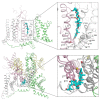Brevetoxin versus Brevenal Modulation of Human Nav1 Channels
- PMID: 37504927
- PMCID: PMC10382042
- DOI: 10.3390/md21070396
Brevetoxin versus Brevenal Modulation of Human Nav1 Channels
Abstract
Brevetoxins (PbTx) and brevenal are marine ladder-frame polyethers. PbTx binds to and activates voltage-gated sodium (Nav) channels in native tissues, whereas brevenal antagonizes these actions. However, the effects of PbTx and brevenal on recombinant Nav channel function have not been systematically analyzed. In this study, the PbTx-3 and brevenal modulation of tissue-representative Nav channel subtypes Nav1.2, Nav1.4, Nav1.5, and Nav1.7 were examined using automated patch-clamp. While PbTx-3 and brevenal elicit concentration-dependent and subtype-specific modulatory effects, PbTx-3 is >1000-fold more potent than brevenal. Consistent with effects observed in native tissues, Nav1.2 and Nav1.4 channels were PbTx-3- and brevenal-sensitive, whereas Nav1.5 and Nav1.7 appeared resistant. Interestingly, the incorporation of brevenal in the intracellular solution caused Nav channels to become less sensitive to PbTx-3 actions. Furthermore, we generated a computational model of PbTx-2 bound to the lipid-exposed side of the interface between domains I and IV of Nav1.2. Our results are consistent with competitive antagonism between brevetoxins and brevenal, setting a basis for future mutational analyses of Nav channels' interaction with brevetoxins and brevenal. Our findings provide valuable insights into the functional modulation of Nav channels by brevetoxins and brevenal, which may have implications for the development of new Nav channel modulators with potential therapeutic applications.
Keywords: Nav; PbTx-2; PbTx-3; brevenal; brevetoxins; ladder-frame polyethers; voltage-gated sodium channels.
Conflict of interest statement
The authors declare no conflict of interest.
Figures






References
-
- ACS Molecule of the Week: Brevetoxins. [(accessed on 15 January 2023)]. Available online: https://www.acs.org/molecule-of-the-week/archive/b/brevetoxins.html.
-
- Pierce R.H., Henry M.S., Blum P.C., Osborn S.E., Cheng Y.S., Zhou Y., Irvin C.M., Bourdelais A.J., Naar J., Baden D.G. Compositional changes in neurotoxins and their oxidative derivatives from the dinoflagellate, Karenia brevis, in seawater and marine aerosol. J. Plankton Res. 2011;33:343–348. doi: 10.1093/plankt/fbq115. - DOI - PMC - PubMed
MeSH terms
Substances
Grants and funding
LinkOut - more resources
Full Text Sources

